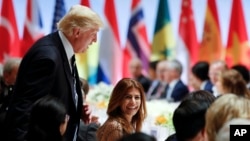U.S. President Donald Trump and Russian President Vladimir Putin held a second, previously undisclosed meeting at the G-20 summit earlier this month in Germany, White House officials confirmed Tuesday night.
The two presidents met face-to-face for the first time in Hamburg on July 7, for more than two hours of talks that were extensively covered at the time.
But it has now emerged that Trump and Putin had a second discussion during a dinner that same evening for the heads of state from the Group of 20 and their spouses.
Trump took to Twitter quickly to repudiate the media reports: "Fake News story of secret dinner with Putin is 'sick.'"
There was no immediate word on what was discussed at the meeting, which lasted roughly an hour, according to Ian Bremmer, president of the political risk consultancy Eurasia Group.
'Just a brief conversation'
The White House had a sharply different account of what happened. Officials speaking on background, which meant they could not be identified, said: “There was no ‘second meeting’ between President Trump and President Putin, just a brief conversation at the end of a dinner.”
Bremmer first reported the Trump-Putin meeting Tuesday in a newsletter sent to his clients. Appearing on U.S. networks as the news spread, Bremmer said he had been told about the Trump-Putin exchange by others attending the formal dinner. The press was barred from the proceedings.
The two presidents were joined only by Putin's translator as they spoke in a conference hall on the banks of the Elbe River. Others dinner guests were seated nearby, but the spacious table setting made it possible to keep the conversation private.
No US interpreter present
The fact that Trump was not joined in the conversation by his own translator raised eyebrows among other leaders at the dinner, according to Bremmer, who called it a “breach of national security protocol.”
The White House, however, said only one translator per delegation was permitted at the dinner, and Trump had with him an interpreter who spoke Japanese, but not Russian.
Bremmer told The Washington Post that other leaders who witnessed the U.S.-Russian meeting were “befuddled” by the conversation, held in full view — but not listening distance — of others.
“Pretty much everybody at the dinner thought this was pretty weird,” Bremmer told The New York Times. “… Here is the president of the United States, who clearly wants to display that he has a better relationship personally with President Putin than any of us, or simply doesn't care. They were flummoxed, they were confused and they were startled.”
No official record of event
Media accounts of the second Trump-Putin conversation noted that the U.S. government had no official record of the U.S. and Russian leaders' meeting, since no other American official accompanied Trump for the talks, however brief or lengthy they were.
American news networks prominently covered the Trump-Putin exchange as urgent, breaking news, prompting commentators to observe the timing of the new disclosures was not good for the administration.
Last week, the news was dominated by reports of a meeting in June 2016 between Donald Trump Jr., the president's eldest son, and a series of Russians including a Kremlin-linked lawyer; a former Soviet spy; a translator previously investigated for money laundering; and a second Russian translator.
Trump Jr. tried to minimize that session in New York as a routine, brief and uneventful meeting, but piecemeal disclosures of what happened and who took part forced him to switch his story several times.
White House slow to respond
The president has continued to deny any collusion with Russia, and insists that the U.S. will benefit if he can build a friendship with the Russian leader.
There was some delay Tuesday evening before White House officials responded to accounts of the second Trump-Putin encounter in Hamburg.
When they issued their background statement later, the White House officials said any notion that the administration was trying to conceal the second meeting was "false, malicious and absurd."
Separately, the White House announced Tuesday night that Trump has decided to nominate former Utah governor and U.S. ambassador to China Jon Huntsman to be the next U.S. ambassador to Moscow.






